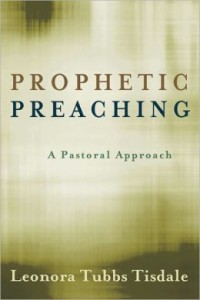Prophetic Preaching, reviewed by Jonathan Downie
From Pneuma Review Fall 2013.
 Leonora Tubbs Tisdale, Prophetic Preaching: A Pastoral Approach (Westminster John Knox Press, 2010), 138 pages, ISBN 9780664233327.
Leonora Tubbs Tisdale, Prophetic Preaching: A Pastoral Approach (Westminster John Knox Press, 2010), 138 pages, ISBN 9780664233327.
There are some occasions where the reader finishes a book unsure whether they should praise the author for writing a challenging and necessary work or criticise them for missing vital emphases. Prophetic Preaching is one of those books.
To begin with, the author’s definition of prophetic preaching is surprising. For Tisdale, “prophetic preaching” is not tied to any prediction of the future nor to speaking out any directly Spirit-inspired words but instead to preaching “based on prophetic biblical texts that call people to live into God’s vision for justice, peace, and equality in our world” (p. 3). What is presented then is a “social justice gospel” in much the same way that the preaching of some within certain Pentecostal traditions has been labelled a “prosperity gospel”. The rest of the book will provide ample evidence of both the potential and the danger of adding the phrase “social justice” in front of the gospel.
The first chapter covers a few definitions of “prophetic preaching”, before using these definitions as a basis for outlining seven hallmarks of this kind of preaching. These hallmarks range from an expression of the Biblical grounding of prophetic preaching (p. 10, point 1) to the corporate focus of prophetic preaching (p. 10, point 3). Reflecting what will be one of the most welcome arguments of the book, point seven points out that prophetic preaching “requires of the preacher a heart that breaks with the things that break God’s heart … and a strong reliance on the presence and power of the Holy Spirit” (p. 10). The chapter then ends with seven reasons for resistance to prophetic preaching. In six of these seven reasons, Tisdale covers ground that will be recognisable to many church leaders, including the insecurities than can render preaching less effective. What is most striking is the first reason, where Tisdale takes issue with models of Biblical interpretation that focus on evangelism over social justice (pp. 11-12). Many in Pentecostal churches would almost certainly take issue not only with her view that social justice better reflects “the heart of the gospel” than evangelism but also that such a view of the gospel “relegate[s] prophetic texts to the periphery of the Scriptures” (p. 11). These are arguments that will be returned to later.
In the second chapter the book really comes into its own, with its focus on “reclaiming a spirituality for activism” (p. 22). Tisdale’s appeal for a reconnection of silence and prophetic speech (pp. 22-23), individual and corporate aspects of biblical interpretation (pp. 28-32) and “prayer and prophetic witness” (pp. 32-35) all tackle issues that are key for the modern church. The overall theme of this chapter is a call for preachers to join together what the Bible says to each of us as individuals and what it says to us as a church or nation. The only issue in this chapter is the lack of an explicit appeal for preachers to call their congregants to reconnect their private and public service to God, an appeal which would obviously have strong biblical grounding (e.g. the book of Haggai, Isaiah 58 etc).


